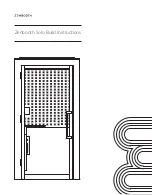
probability of interference is lower than in 2D mode or Color mode, because the susceptible
frequency range is lower. Therefore, you are more likely to see interference in 2D or Color
modes.
As an example, if a portable transmitter has maximum radiated power of 1 W and an operating
frequency of 156 MHz, it should only be operated at distances greater than 1.2 m (3.9 ft) from
the system. Likewise, a 0.01-W Bluetooth wireless LAN device operating at 2.4 GHz should be
placed no closer than 0.24 m (9.5 in) from any part of the system.
Avoiding Electromagnetic Interference
A medical device can either generate or receive electromagnetic interference. The EMC
standards describe tests for both emitted and received interference. Emission tests deal with
interference generated by the device being tested. Philips ultrasound systems do not generate
interference based on the tests described in the referenced standards.
An ultrasound system is designed to receive signals at radio frequencies and is therefore
susceptible to interference generated by RF energy sources. Examples of other sources of
interference are medical devices, information technology products, and radio and television
transmission towers. Tracing the source of radiated interference can be a difficult task.
Customers should consider the following in an attempt to locate the source:
• Is the interference intermittent or constant?
• Does the interference show up only with one transducer or with several transducers?
• Do two different transducers operating at the same frequency have the same problem?
• Is the interference present if the system is moved to a different location in the facility?
• Can the EMC coupling path be attenuated? For example, placement of a transducer or
printer close to an ECG cable can increase electromagnetic interference. Moving the cable
or other medical equipment away from the location of the transducer or printer can result
in reduced electromagnetic interference.
The answers to these questions will help determine if the problem resides with the system or
the scanning environment. After you answer the questions, contact your Philips service
representative.
Use Restrictions Due to Interference
The physician must determine if an artifact caused by radiated interference will have a negative
impact on image quality and the subsequent diagnosis.
Electromagnetic Compatibility
Safety
EPIQ 7 User Manual 4535 617 25341
81
Summary of Contents for epiq 7
Page 4: ...4 EPIQ 7 User Manual 4535 617 25341 ...
Page 26: ...Read This First Recycling Reuse and Disposal 26 EPIQ 7 User Manual 4535 617 25341 ...
Page 94: ...DVD RW Drive System Overview System Components 94 EPIQ 7 User Manual 4535 617 25341 ...
Page 154: ...Customizing the System Custom Procedures 154 EPIQ 7 User Manual 4535 617 25341 ...
Page 172: ...Performing an Exam Ending an Exam 172 EPIQ 7 User Manual 4535 617 25341 ...
Page 298: ...System Maintenance For Assistance 298 EPIQ 7 User Manual 4535 617 25341 ...
















































